Menu
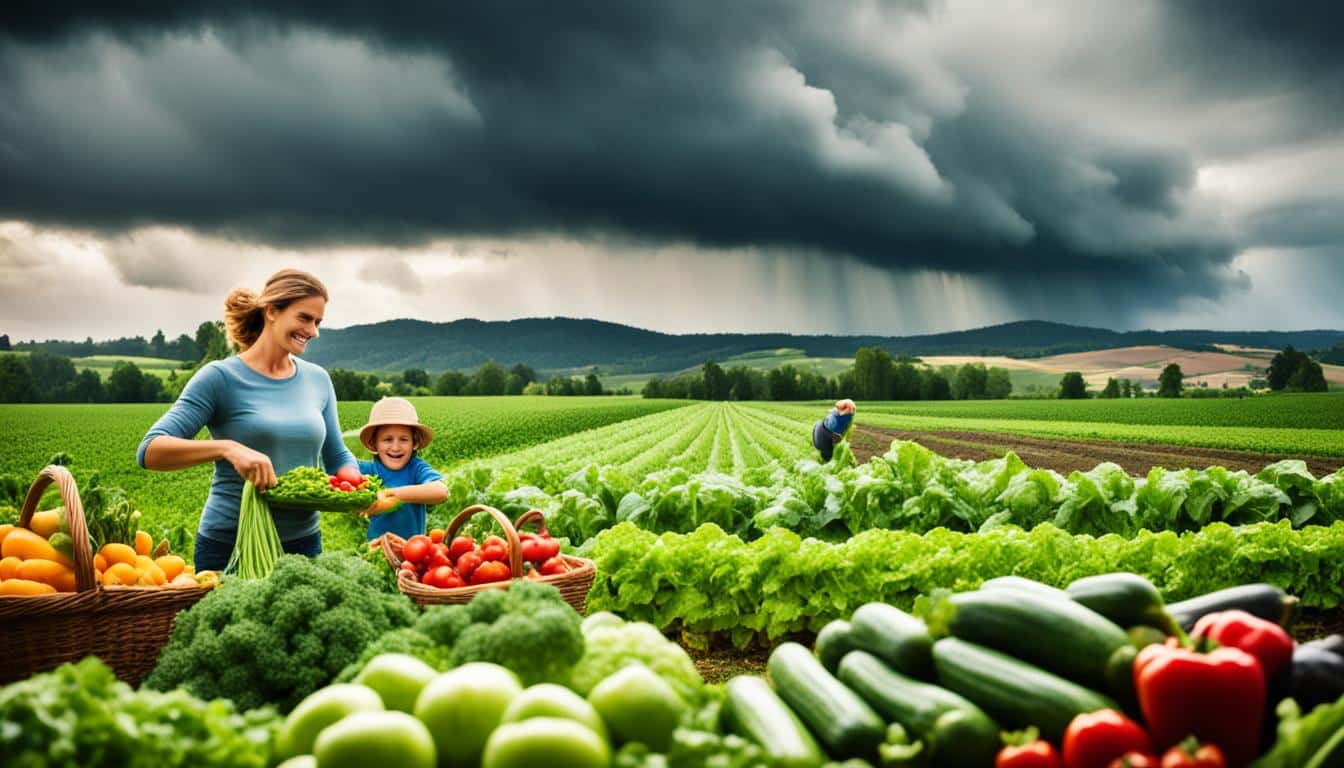
Organic farming makes a big difference to the Earth. It helps a lot in fighting climate change. The soil under organic farms has more carbon. This is a key point in reducing climate problems. Organic farming offers many benefits. It’s not just about better crops.
Studies show that organic farms have more life. This was found in a review of 766 reports. They help the soil stay rich, prevent water pollution, and store carbon. Choosing organic products helps our planet. It means we’re supporting farming that does less harm. This lowers the cost on nature.
Organic farming focuses on keeping the Earth’s systems healthy over the long term. It uses nature’s processes and materials. This improves how much food we can grow. Organic farming avoids chemicals, focusing on methods that help nature work well.
Choosing organic farming means supporting a diverse environment. It also means using resources that can be renewed. The top reasons to choose organic farming include less harm to the environment and better quality products.
Organic farming looks at the bigger picture. It cares about many important aspects:
Choosing organic farming is good for the planet. It means being part of farming that doesn’t harm the Earth as much. Organic methods support healthy soil and diverse wildlife. They also help over the years to keep farming sustainable.
While organic farms might produce less food, they bring big advantages:
Here’s a quick look at how organic and non-organic farming compare in key areas:
| Factor | Organic Farming | Conventional Farming |
|---|---|---|
| Energy Use | Uses less non-renewable energy | Uses a lot of fossil fuels |
| Biodiversity | Keeps biodiversity high | Doesn’t help biodiversity as much |
| Soil Health | Boosts soil health | Doesn’t do much for soil health |
| Use of GMOs | Does not include GMOs | GMOs are commonly used |
| Profitability | Can be more profitable | Profits can vary |
| Environmental Impact | Causes less pollution | Causes more pollution |
Choosing eco-friendly agriculture is both smart and kind. This method of farming supports our health and our planet. By using natural ways in farming, we keep the planet’s balance and grow food well.
Organic farming plays a crucial role in protecting our environment. It boosts ecosystems, helping the planet stay healthy. Now, let’s look at its key impacts on the environment.
One big advantage of organic agriculture is better soil health. This happens because of increased soil carbon, which fights climate change better.
These methods help create ecosystems that boost soil quality. They’ve been shown to increase diversity and ensure we can farm sustainably.
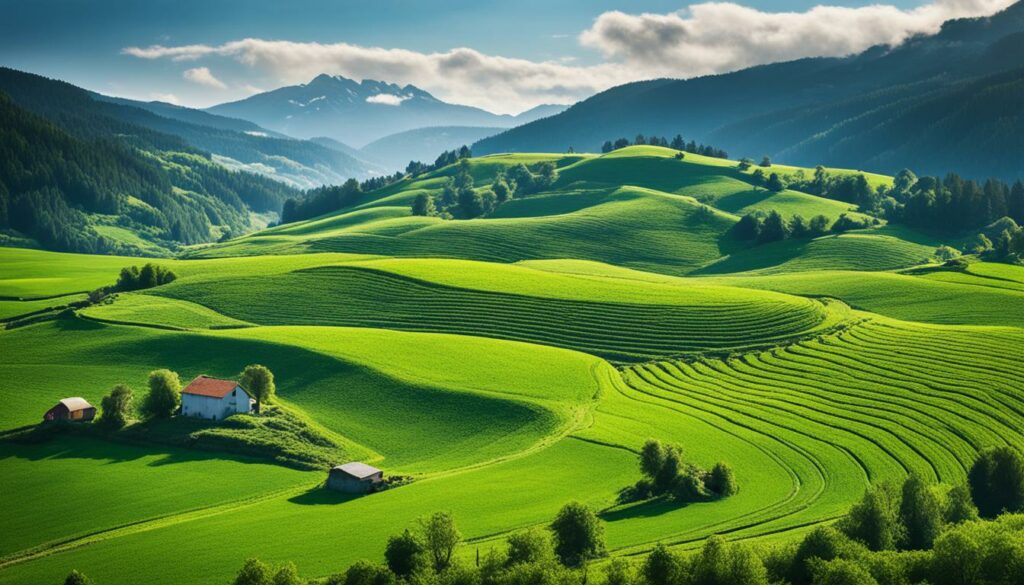
Organic farming also does wonders for our water. It keeps synthetics out, protecting water from pollution. This makes water safer for us and the environment.
When it comes to the big issue of climate change, organic farming leads the way. It uses less fossil fuel and captures carbon. This helps farming and the climate.
In a big study, organic methods were shown to support more biodiversity. This is thanks to avoiding GMOs and protecting our natural resources.
These methods clearly show how important sustainable agriculture is. They help fight environmental problems, making our planet better for the future.
Organic farming is not just about now; it secures our future too. It boosts soil’s health naturally, which helps keep the environment in good shape. This method ensures fertile soil for a long time. So, it’s great for making farms strong and keeping our planet healthy.
Organic farming helps soil stay healthy and even makes it better. It doesn’t use artificial treatments like other farming does. Instead, it relies on nature to improve the soil. This leads to more natural carbon in the soil, which helps fight climate change.
Many studies show organic farming is much better at this than non-organic ways. But, we don’t know as much about how it helps in places like Africa and Latin America. So, more research in these areas is needed to know for sure.
| Region | Soil Organic Carbon Increase (%) |
|---|---|
| United States | 20% |
| Europe | 25% |
| Africa | Data limited |
| Latin America | Data limited |
Organic farming helps keep a balance in nature. A detailed review of many studies found that it helps more with biodiversity than other ways of farming. This means it’s better at creating a variety of life in the environment around farms.
Organic farming doesn’t allow GMOs. It fosters natural connections between different parts of the farm. This makes it good at doing things like keeping soil steady, recycling waste, capturing carbon, and making homes for wildlife.
This kind of farming stops soil from washing away. It helps keep the natural balance strong, so farms can keep producing food for a long time. Buying organic products supports this kind of farming. It means you’re helping the environment and farms to stay healthy, now and in the future.
In the end, organic farming is tough but worth it. It’s great for the land and for farming over a long time. By focusing on natural ways to feed the soil and creating healthy ecosystems, organic farming meets big goals for the environment and agriculture. This way, it offers a hopeful path for the future of farming and the earth.
Organic farming is great for stopping soil erosion. Farmers use methods like alternating crops and planting different ones together. They also let some areas grow wild and use natural fertilisers. This protects the soil from being washed away in the rain.
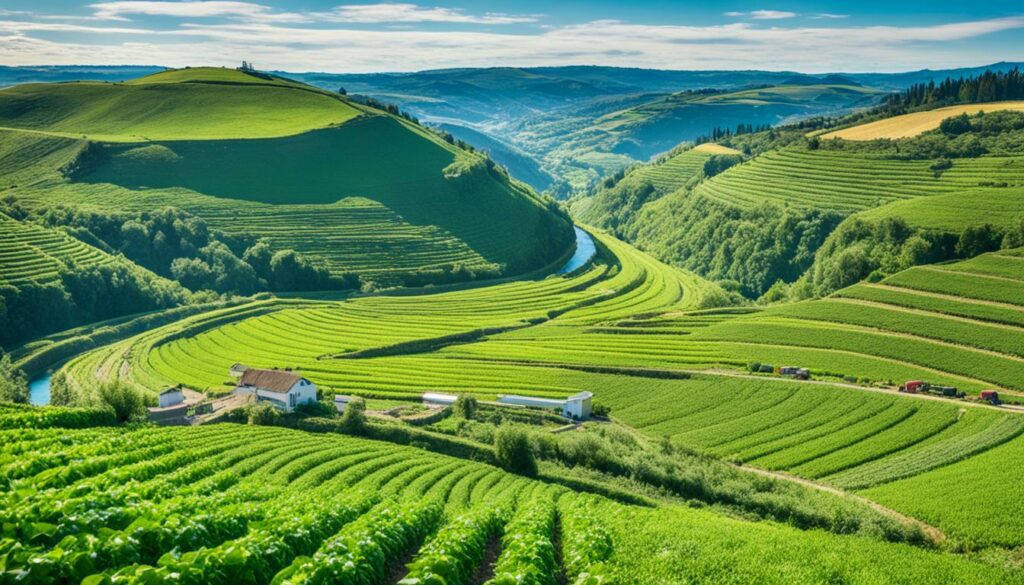
These farming methods do a lot more than save soil. They help keep nature’s balance. Plus, they stop harmful stuff from getting into the water. This is because they don’t use the chemicals that regular farms do.
When it comes to organic farming, less digging and more plant covers are key. Farming this way means the soil isn’t open to the air much, so it stays put. It also means there are lots of different tiny life forms in the soil, which help keep it held together. This is good for stopping soil from washing away.
Keeping the nutrients in the soil is really important for organic farming. By not digging too much and planting certain crops, these techniques keep the good stuff in the soil. It keeps the soil healthy and rich, which makes a farm last a long time.
| Farming Practice | Effect on Sediment Delivery |
|---|---|
| Organic farming with reduced tillage | 0.73 t ha−1 h−1 |
| Intensively tilled organic plots | 1.87 t ha−1 h−1 |
| Conventional farming with no tillage | 0.24 t ha−1 h−1 |
| Intensively tilled conventional plots | 3.46 t ha−1 h−1 |
These organic farming ways really work. They cut down on soil washing away and help keep the land fertile.
Water conservation is key in organic farming. It highlights the importance of being efficient and mindful of the future. Organic methods improve soil, helping it hold more water. This cuts down on pollution risks. The use of natural fertilisers boosts biodiversity. This, in turn, improves water storage and decreases run-off.
Organic farmers deal with many water issues. This includes water from the farm and outside, location, different water regulations, and changing seasons. They focus on using water wisely by checking usage and updating how they water. They often use a method called alternate wetting and drying. This helps to not waste water.
When it comes to saving water, drip irrigation is the best choice. It loses only 2-5% of water to evaporation and less than 1% by seeping too deeply. In comparison, flood irrigation loses a lot more, between 10-30%. Drip irrigation’s low waste makes it a top pick for farmers.
There are many new water-saving ways farmers are using. They include reusing grey and black water. They also use drip systems and solar power for pumping water in dry places. These not only save water, they also use less energy. They help make farms more sustainable.
There are also smart systems that can save water. They water plants based on their needs and how wet the soil is. This can save a lot of water, and money too. It fits well with the ideals of organic farming.
We must acknowledge the role of technology in water conservation. Robotics, drones, and AI systems enhance farm efficiency by enabling precise data analysis and monitoring of water, energy, and fertiliser usage.
Companies like Benchmark Labs make tools that predict the weather. This helps farmers know how much water they’ll need. They also use AI to plan water use better. This leads to smart watering practices.
| Irrigation Method | Water Loss due to Evaporation | Water Loss due to Deep Percolation |
|---|---|---|
| Drip Irrigation | 2-5% | <1% |
| Flood Irrigation | 10-30% | Variable |
The table shows that with the right methods, we can save a lot of water in farming. By using new technology and organic ways, we ensure our water lasts. This is good for both the farm and the planet.
Preserving biodiversity is key in organic farming. It helps keep essential ecosystems going and encourages different species. By not using synthetic chemicals, organic farms promote natural pest control and help keep plant and animal numbers in balance. This supports a rich variety of life, boosting biodiversity.
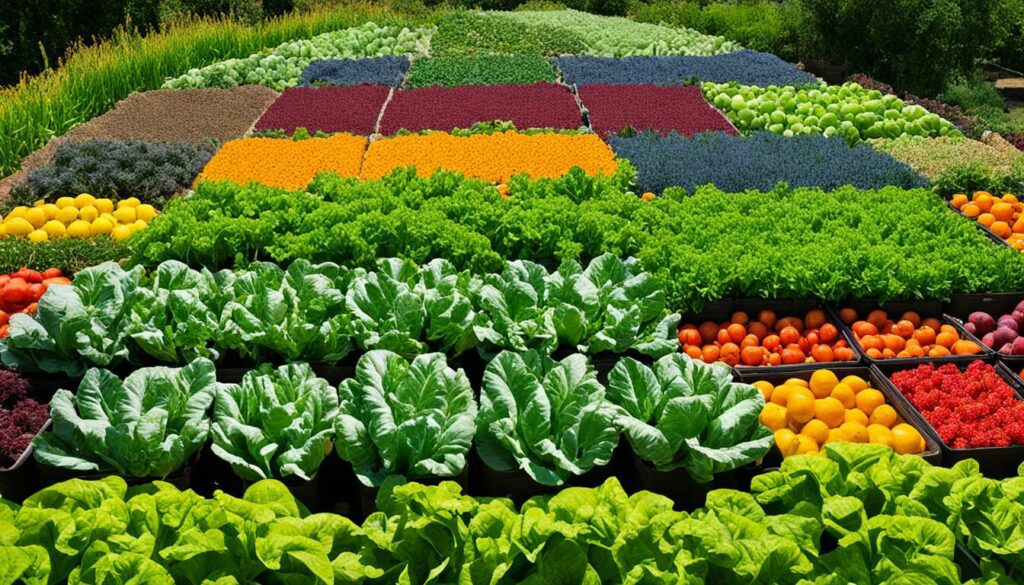
Organic farming is vital for saving natural places. This way of farming keeps land good for wildlife, helping good species like pollinators. For example, Gabriel and Tscharntke (2007) discovered that plants needing insects to pollinate them do especially well under organic care. This increase in plants leads to more diverse habitats. Also, fields with organic crops have more types of pollinators, helping keep nature’s spaces safe (Holzschuh et al., 2008).
Organic farming boosts the number of different species by creating rich, varied spots that many organisms can call home. Crowder et al. (2010) show that this method helps in controlling pests naturally. It also improves the variety of life. Observations by Morandin and Winston (2005) found that wild bees and seeds do better in organic farms. These findings show how important it is to have lots of different species around. In fact, organic areas can have 30% more types of species and 50% more of them in total compared to non-organic areas.
Table: Comparative Impact on Biodiversity
| Practice | Biodiversity Impact |
|---|---|
| Conventional Farming | Lower pollinator diversity, reduced wild bee abundance |
| Organic Farming | Supports higher species diversity, increased seed production |
| Genetically Modified Canola Fields | Less beneficial than organic, more beneficial than conventional |
In summary, organic farming really changes biodiversity for the better. It achieves this by encouraging many species and protecting their homes. Important studies by Fuller et al. (2005) and Pimentel et al. (2005) show us the benefits on our world and our money. They underline the huge part organic farming plays in keeping our world rich and running well.
Organic farming uses very few synthetic pesticides and fertilisers. It focuses on farming without chemical harm, which is good for the environment and our health. By using methods like crop rotation and introducing helpful insects, it relies less on dangerous chemicals. This method is key for keeping wildlife diverse and makes sure our food is safe.
In 2016, Sikkim in India went completely organic. This milestone shows the big benefits of farming without chemicals. It’s a model for other places that want to lower their use of synthetic inputs. European countries like Finland, Austria, and Germany are setting goals. They want 20% of their land to be used for organic farming. This shows a worldwide move towards more sustainable agriculture.
But, switching to organic farming isn’t without its challenges. For example, peas grown without chemicals in Sweden can be more harmful to the climate. They have about 50% more impact. This shows we must keep improving organic methods to be kinder to the planet.
| Country/Region | Organic Farming Initiatives | Outcomes |
|---|---|---|
| United States | 3% of total food sales in 2012 | Increasing consumer support for sustainable practices |
| England and Wales | Potential for 20% reduction in carbon emissions | Lower yield but enhanced environmental benefits |
| Bhutan | Plans for 100% organic by 2020 | Goals to promote sustainable agriculture |
| Sikkim, India | Achieved 100% organic status in 2016 | Successful large-scale application of organic practices |
In the United States, concerns are rising over the real meaning of organic labels. Trust from consumers is crucial. Protecting the truth of certified organic products is important. Choosing farming methods that avoid chemicals and use nature for pest control can help. It will lead to a better future for farming. This benefits our communities and the world around us.
Choosing organic farming is great for us and the planet. Organic foods are healthier because they’re free from synthetic chemicals. They also offer more nutrition for a better diet.
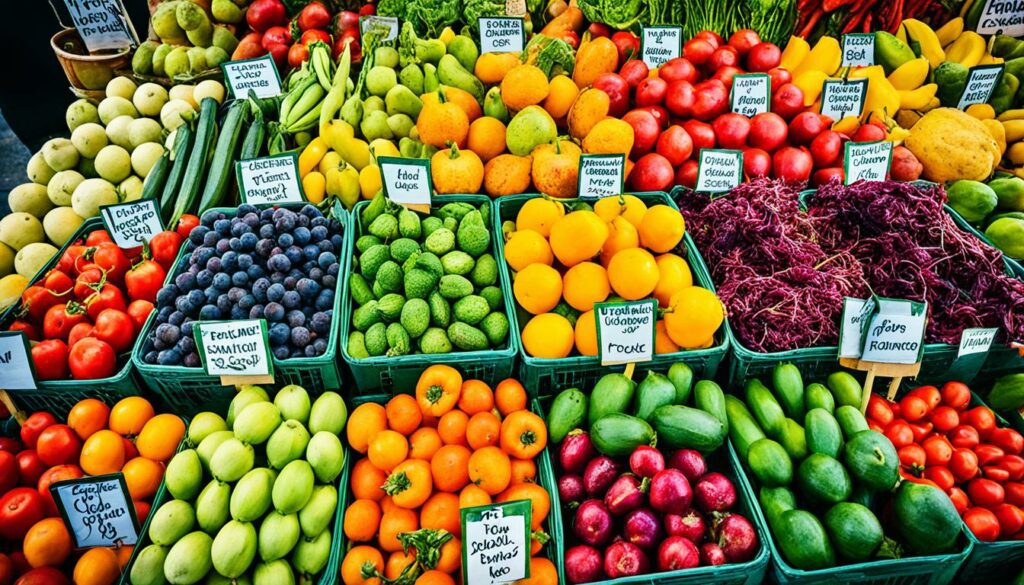
Eating organic food lowers our chemical intake. This happens because organic farming doesn’t use GMOs. As a result, organic food is naturally richer in antioxidants and nutrients.
Organic farming supports a healthy environment. By improving soil and promoting biodiversity, it sustains ecosystems. It also means using fewer harmful chemicals and better water sources.
Less energy is used in organic farming. Plus, it helps fight climate change by capturing carbon. So, choosing organic isn’t just good for us; it’s key for a better future.
| Aspect | Organic Farming | Conventional Farming |
|---|---|---|
| Pesticide Use | Minimal | High |
| Soil Health | Enhanced | Degraded |
| Biodiversity | High | Low |
| Water Pollution | Low | High |
| Energy Use | Reduced | High |
Supporting organic farming helps our health and the planet. It cuts pollution and supports sustainable farming. So, choosing organic is a smart and impactful step for everyone.
Organic farming helps fight climate change significantly. It does so by trapping carbon in the soil and cutting down on energy use. This is done without relying on harmful chemicals. Instead, it uses sustainable methods that benefit the Earth greatly.
Organic farming’s role in locking away carbon is very important. It includes things like not ploughing much, changing the crops every year, and composting organic waste. If 20% of our farm lands become organic by 2045, a big change can happen.
The goal is to keep carbon dioxide out of the air. This powerful gas causes the Earth to warm up. In California, there’s been a big increase in organic farming from 2014 to 2019. These efforts are vital in fighting climate change.
| Statistic | Benefit |
|---|---|
| Organic farming systems use 45% less energy | Energy conservation |
| Organic farms can bolster carbon sequestration | Reduction in greenhouse gases |
| Reduction of N2O emissions by 700-800% | Minimise potent greenhouse gases |
| Organic yields up to 40% higher in drought years | Improved crop resilience |
Organic farming is also very good at saving energy. A long study found that organic farms use 45% less energy than others. They achieve this by avoiding artificial chemicals and using eco-friendly methods.
These approaches not only help the planet, but they also save money. It’s estimated that cutting down on synthetic fertilizers could lower emissions by 20%. This effect is because farming wouldn’t produce as many harmful gases.
To sum up, organic farming is a great way to tackle climate change. It helps hold onto carbon and saves energy. This makes farming kinder to our planet and ensures a healthy future for agriculture.
Organic farming is on the rise due to a growing organic market and its profitability. Shifts to organic can take three to five years to match a big part of conventional farm output. Yet, it’s worth it. Organic farms cut reliance on oils and costly stuff over time.
Research shows organic farming can be as or more profitable than usual ways. Even after cutting profits to half of today’s organic bonus, they stand strong. This model avoids overfarming and harmful chemicals, which helps the Earth. By adding natural materials to soil, it can store more carbon. This wins better prices for environmentally friendly goods.
A unique point of organic farming is how it protects our nature with less need for chemicals. This cuts long-term expenses for farmers and helps them stay financial sound. Places strong in organic farming see good changes. Poverty drops, and average incomes rise, making life better locally.
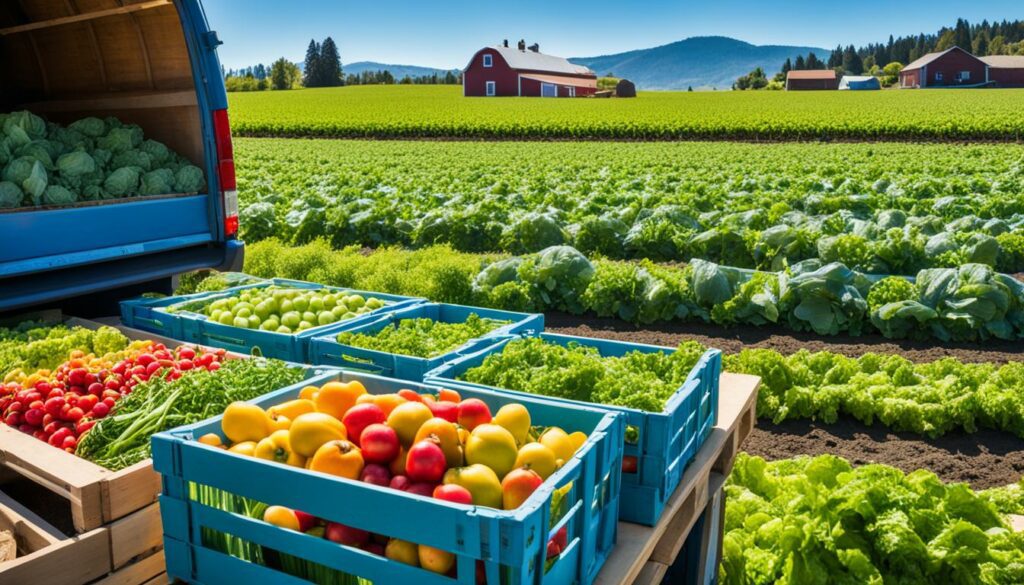
Leading companies like Farmland LP and Inglewood Farm highlight the benefits of going organic. Farmland LP runs over 2,000 acres of organic land and is still growing, showing that financial success in this sector is possible. Inglewood Farm, the largest in Louisiana, is a prime example of how big organic farming can get.
Now, the global market for organic goods is worth about $140 billion. Australia alone contributes $2.6 billion. Studies suggest that organic can match and sometimes beat conventional farming in output. It’s especially true in dry areas, showing the strength of organic methods.
Organic food often has more nutrients and can cost less to produce. The Rodale Institute’s trial found that organic systems can be 3-6 times more profitable. They also use less energy. This solid economic evidence supports organic farming.
Organic farming helps our economy, our planet, and offers a future for sustainable agriculture. By backing organic farming, we support our planet and improve the lives of farmers.
Organic farming offers more than just health gains. It brings people together and helps the environment. It also boosts local economies. This is through supporting local food systems.
This strengthens bonds between farmers and consumers. In places where organic farming is popular, incomes are higher. Poverty also drops. This shows how much it helps people.
Organic farming stresses learning and working together for a better world. This helps people in the community. They can learn and join in on making things more sustainable.
Urban agriculture supports better food access. It gets people to eat more fruits and veggies. It also gets them outside and closer to nature. This is really good for health.
Community gardens in cities make places feel special. They keep local traditions alive. They also bring people together. This makes a neighbourhood safer and happier for everyone.
The impact of organic farming on society is broad and positive. It boosts how we relate to each other. It gives us more pride in our homes. Plus, it helps our economy grow stronger and more stable.
Organic farming is not just about healthy food and saving the planet. It’s about building lively, caring communities. It’s a big part of making us healthier, happier, and more connected.
Organic farming plays a key role in making our food systems secure. It helps create strong, reliable food supplies. By using a mix of different farm methods, it can fight off problems like climate change and pests. This means we can count on having enough good food in the future.
Organic farms are tougher in the face of tough times. They grow a range of plants and animals. This diversity lowers the chance that a whole crop will fail. That’s good news for our food security. Organic soils are healthier, which means they can produce more food, especially in areas with not much food.
Also, organic farming uses fewer artificial chemicals. This makes our food safer and the way we farm better for the planet.
Organic farming is also good for making our food supply more dependable. It focuses on producing food locally. This means we are not as reliant on long and easily broken supply chains. Local food systems help communities take care of themselves and keep their food supply steady.
Cover crops and mulching save water, which is very important in places where water is scarce. This helps support farmers in small-scale places who need a stable income and reliable food.
Plus, organic farming doesn’t allow GMOs. This protects the variety of life on Earth. It’s essential for making sure we can keep feeding ourselves in the future without harmful chemicals.
Studies show that organic farming is great for the environment. It keeps more carbon in the soil. This helps fight climate change and keeps our food supply safe around the world.
Organic farming also helps the earth in other ways, like keeping the soil from eroding and storing carbon. These things are key for a future where we can all rely on a healthy and stable food supply.
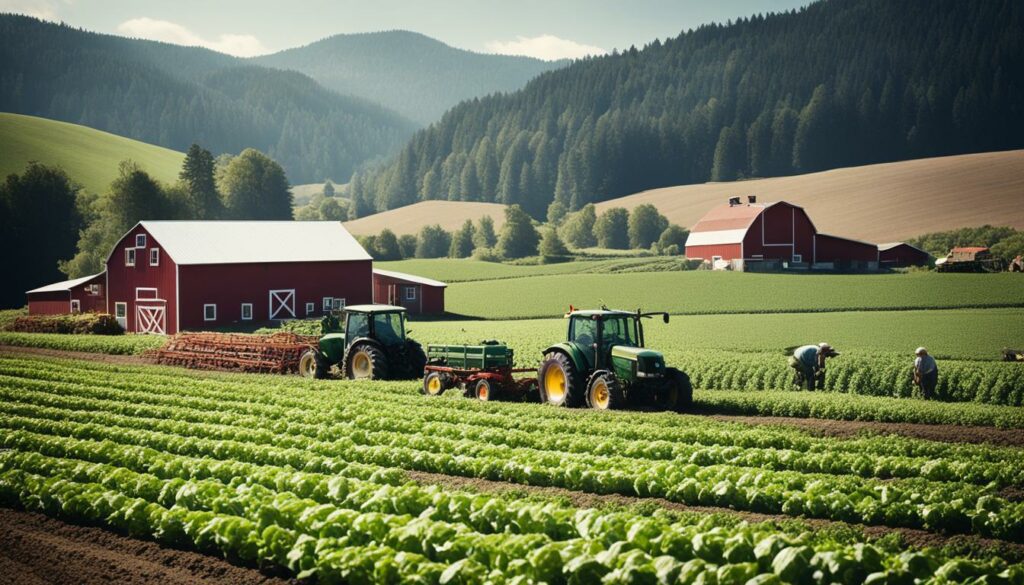
Organic farming has many benefits but also faces challenges and criticisms. One big issue is the concern over lower yields compared to non-organic methods. This debate shows how hard it is to grow enough food for the world without using more land, which may increase greenhouse gases.
Natural ways to control pests are harder and take more time than using chemicals. This makes farming cost more. Also, meeting the strict organic standards is hard and expensive. It makes it tough for farmers.
Another key concern is if the rules and certifications for being organic really work. With the organic industry growing, people question if it’s really about being sustainable. This has led to calls for stronger and clearer ways to check if organic methods are actually good for the planet.
Let’s compare these challenges in detail:
| Challenge | Conventional Farming | Organic Farming |
|---|---|---|
| Chemical Exposure | Increased due to synthetic inputs | Reduced with natural alternatives |
| Nutrient Density | Lower concentrations of vitamins and antioxidants | Higher concentrations of vitamins and antioxidants |
| Labour and Input Costs | Lower | Higher due to manual processes |
| Yields | Typically higher | Potentially lower |
| Pest Control | Synthetic chemicals simplify the process | Natural methods are time-consuming |
| Certification | Generally unnecessary | Required, costly, and complex |
The *organic farming yield debate* is a key issue that demands more research. By finding new solutions to these problems, we can make organic farming more sustainable and successful in the long run.
The future of organic agriculture looks promising with new tech and growing policy support. Precision farming is a key area, set to be worth $16.35 billion by 2028. This high value shows the big chance for better efficiency in organic farming.
A CAGR of 13.1% means innovation is crucial for the future of organic farming. It proves how much importance this sector places on new ideas.
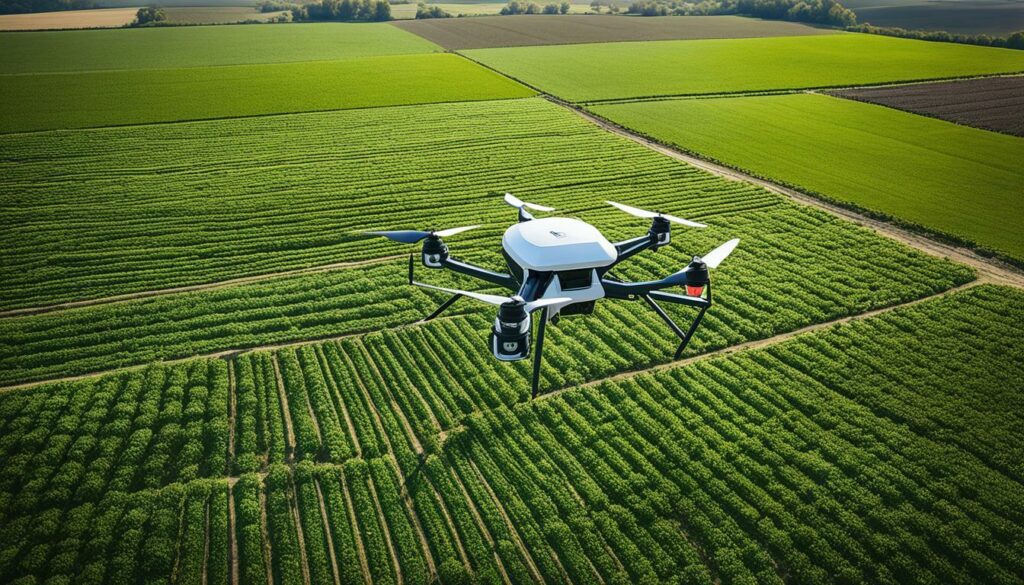
Technology is changing how we do organic farming. For instance, CEAT Specialty has created a tyre called Galileo Cup-Wheel. It fights soil compaction by working at a super low pressure. This is very important for managing soil sustainably.
The SustainMax tyre is also a game-changer. It uses over 80% eco-friendly materials. This shift towards green farming methods is a big step ahead.
Then there’s the EnergyMax tyre, made for EC tractors. It’s designed to use less fuel and lower emissions. This fits perfectly with the goal of being more eco-friendly.
Support from policies is key for organic farming to grow. In 2021, the U.S. Department of Agriculture (USDA) only put 2% of its research budget towards this area. However, organic farming is growing faster than traditional farming.
In the UK, farmers benefit a lot from working together. They share new knowledge and technologies. This helps everyone improve and promotes innovation.
Although the growth of organic farming outpaces the support it gets, putting more money into it could really help. Supporting sustainable agriculture policies is crucial. For example, by investing more in research and marketing, as well as giving more technical help, there could be big improvements.
Looking at the United States, there are areas where organic farming is really taking off. In these places, new jobs are being created, unemployment is dropping, and the agriculture business is booming. It shows how proper policy support can bring real economic benefits.
For organic farming to keep growing, we need to focus on new technology and stronger policies. These changes can overcome current challenges. They’ll also help the sector move towards more sustainable food systems, fight climate change, protect biodiversity, and boost the economy.
| Aspect | Technological Advancement | Policy Support |
|---|---|---|
| Precision Farming Market Growth | Expected to reach $16.35 billion by 2028 | Improved funding could boost organic research |
| CEAT Specialty Innovations | Galileo Cup-Wheel, SustainMax, EnergyMax tyres | Collaborative efforts in the UK farming sector |
| USDA Research Budget | Inadequate at 2% in 2021 | Potential for increased federal investments |
Choosing organic farming is key for a greener tomorrow. Many studies have shown its benefits for our planet. These include using more carbon in the soil to help fight climate change.
Organic farming is also better for wildlife. A review of 766 studies found it helps more kinds of plants and animals live together. This is compared to other ways of farming.
It doesn’t use genetically modified plants which helps natural diversity. Plus, it uses less energy. Less energy use means fewer greenhouse gases that cause global warming. Organic farming also keeps our water cleaner by avoiding harmful chemicals.
While organic crops tend to yield less, people are buying more of them. For example, in the US, sales of organic food almost doubled in just 11 years. This shows people are choosing organic for their health and our planet.
Organic farming is vital for the future. It improves our food and protects nature. By buying organic, we support a sustainable world for everyone. Moving towards organic farming is a big step in the right direction.
Organic farming improves soil health and lessens water pollution. It boosts biodiversity and uses fewer synthetic chemicals. These benefits also help consumers and the economy.
It protects our planet and health by avoiding harmful pesticides and fertilisers. It supports long-lasting health for our planet’s ecosystems too.
It boosts soil health, keeps water clean, and helps battle climate change. By storing carbon and conserving water, it makes a positive impact.
Farming organically means using crop rotation and organic fertilisers. These practices keep soil fertile and prevent erosion. This ensures the environment stays healthy for the long term.
Organic farming uses techniques like minimal tillage and cover crops. These methods keep soil rich and prevent erosion, keeping nutrients in the soil.
It uses natural fertilisers and varied crops to improve soil. This helps water penetrate the soil better. Efficient irrigation is also promoted to save water.
By preserving natural habitats and welcoming diverse species, organic farming helps our ecosystem. It’s vital for a healthy environment and productive farms.
Less use of pesticides and fertilisers cuts pollution and protects water. Natural ways to manage pests and fertilise keep our environment balanced.
Organic food is grown without harmful additives and pesticides. This might mean more nutrients and less pesticide residue. It’s a healthier choice for us.
Organic practices lead to better soils and cleaner water. They reduce the harm from chemical farming, supporting a healthier environment.
It fights climate change by locking carbon in the soil and using less energy. Less tilling and more composting also help the planet.
Demand for organic food is growing, leading to better prices. This helps farmers earn more. It’s especially good for small farmers.
It supports local food and farmers, bringing communities together. People enjoy fresher food. It boosts local economies too.
Organic farming makes food systems strong against climate and pests. It encourages local production, which depends less on distant sources.
There are concerns about lower yields, and it might need more land. Some say it could increase greenhouse gases. Ensuring certification and regulation can be challenging.
Continuous research and balanced action are needed to address these issues.
With technology and policy support, organic farming’s future is bright. Tools like precision agriculture can make things more efficient. These efforts aim to expand the use of sustainable farming practices.